CHCAOD004: Complete Assessment Solution for Clients with AOD Issues
VerifiedAdded on 2023/05/31
|6
|1194
|132
Homework Assignment
AI Summary
This document presents a comprehensive solution to an assignment focused on assessing the needs of clients with alcohol and other drug (AOD) issues. The solution covers various aspects, including referral processes, culturally competent care for Aboriginals, risk assessment for patients with AOD and mental health issues, and tools for evaluating drug and alcohol use. It also addresses co-existing mental health disorders, strategies for maintaining client commitment to change, identification of self-harm indicators, and the differences between passive, facilitated, and active referrals. Finally, it outlines the symptoms of depressant, stimulant, and hallucinogen usage. Desklib offers a platform to explore similar solved assignments and study resources.
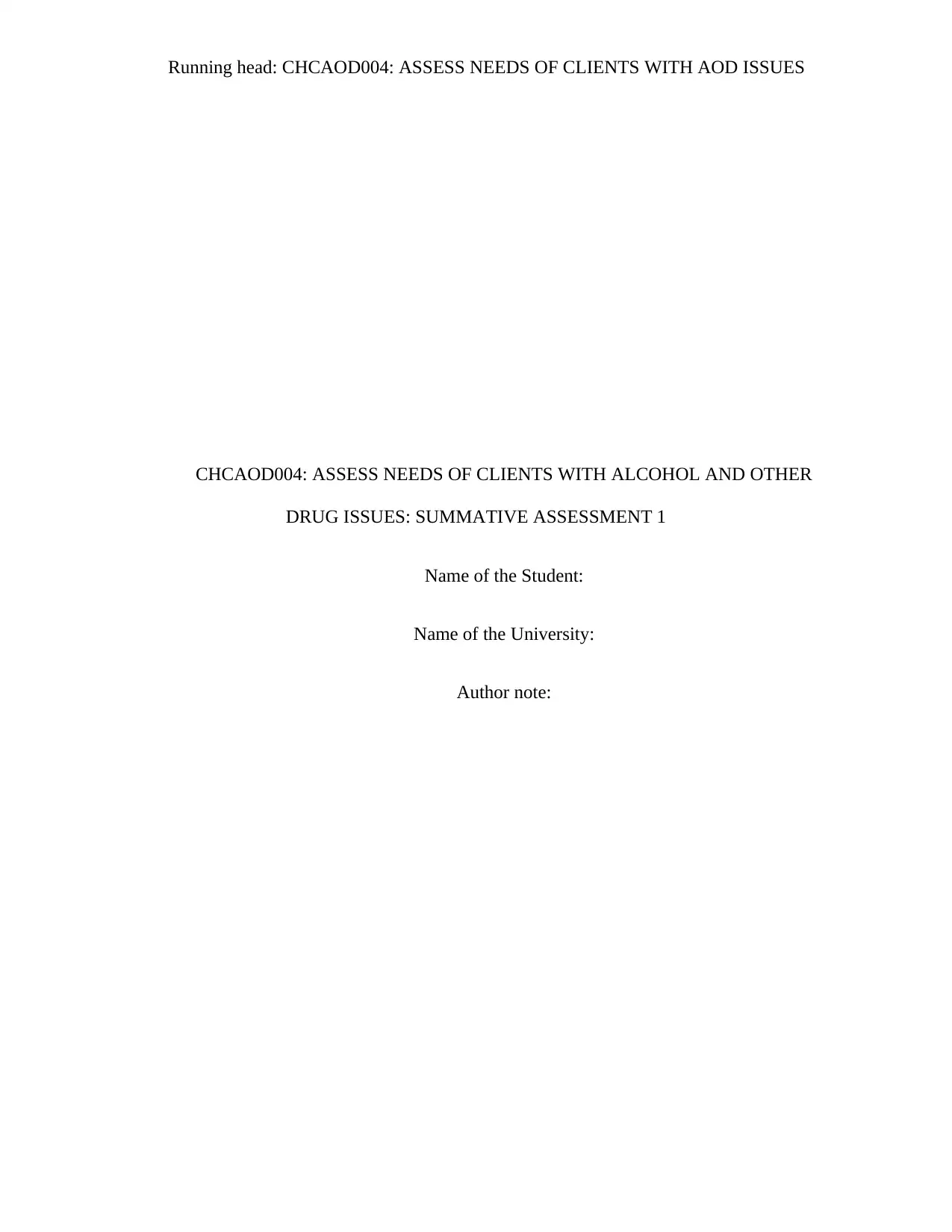
Running head: CHCAOD004: ASSESS NEEDS OF CLIENTS WITH AOD ISSUES
CHCAOD004: ASSESS NEEDS OF CLIENTS WITH ALCOHOL AND OTHER
DRUG ISSUES: SUMMATIVE ASSESSMENT 1
Name of the Student:
Name of the University:
Author note:
CHCAOD004: ASSESS NEEDS OF CLIENTS WITH ALCOHOL AND OTHER
DRUG ISSUES: SUMMATIVE ASSESSMENT 1
Name of the Student:
Name of the University:
Author note:
Paraphrase This Document
Need a fresh take? Get an instant paraphrase of this document with our AI Paraphraser
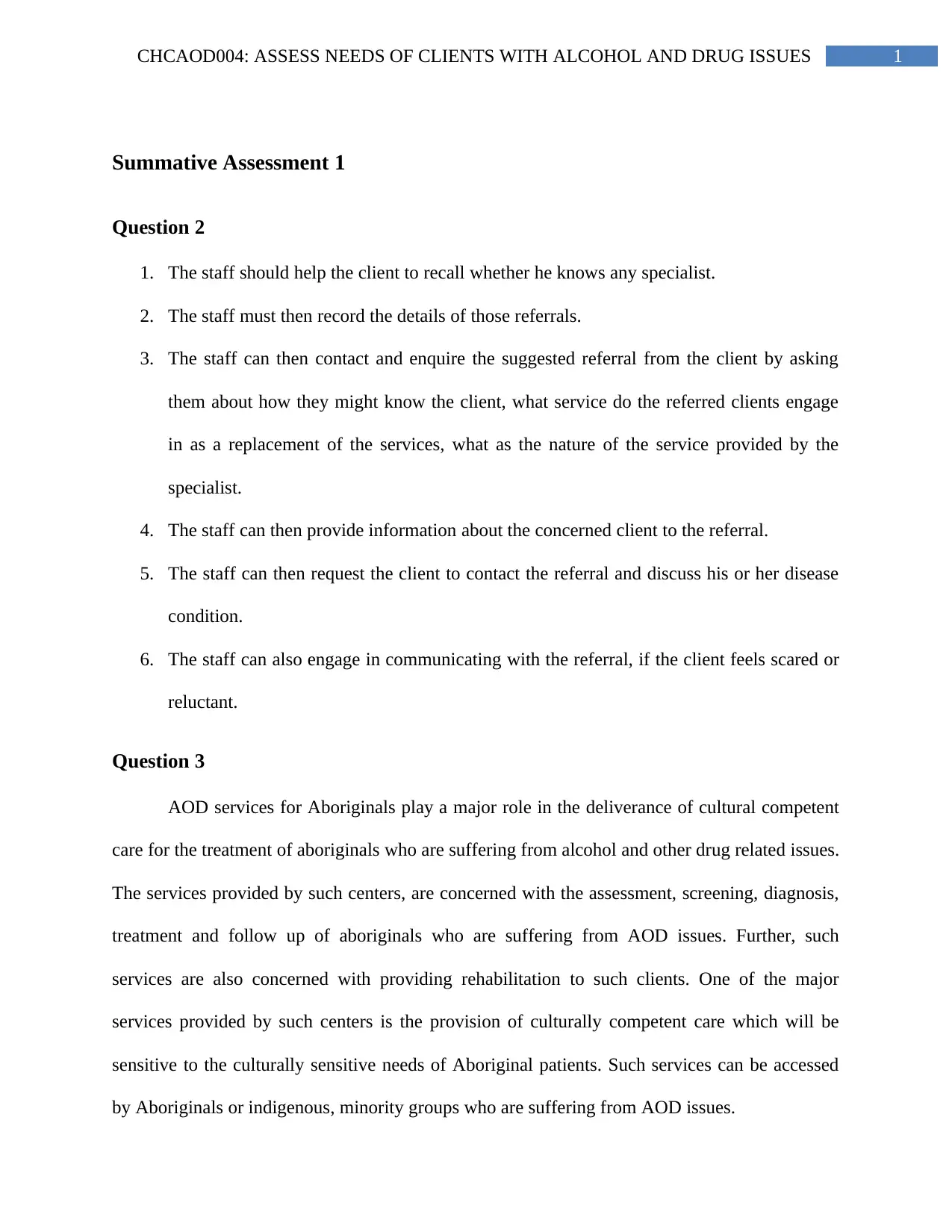
1CHCAOD004: ASSESS NEEDS OF CLIENTS WITH ALCOHOL AND DRUG ISSUES
Summative Assessment 1
Question 2
1. The staff should help the client to recall whether he knows any specialist.
2. The staff must then record the details of those referrals.
3. The staff can then contact and enquire the suggested referral from the client by asking
them about how they might know the client, what service do the referred clients engage
in as a replacement of the services, what as the nature of the service provided by the
specialist.
4. The staff can then provide information about the concerned client to the referral.
5. The staff can then request the client to contact the referral and discuss his or her disease
condition.
6. The staff can also engage in communicating with the referral, if the client feels scared or
reluctant.
Question 3
AOD services for Aboriginals play a major role in the deliverance of cultural competent
care for the treatment of aboriginals who are suffering from alcohol and other drug related issues.
The services provided by such centers, are concerned with the assessment, screening, diagnosis,
treatment and follow up of aboriginals who are suffering from AOD issues. Further, such
services are also concerned with providing rehabilitation to such clients. One of the major
services provided by such centers is the provision of culturally competent care which will be
sensitive to the culturally sensitive needs of Aboriginal patients. Such services can be accessed
by Aboriginals or indigenous, minority groups who are suffering from AOD issues.
Summative Assessment 1
Question 2
1. The staff should help the client to recall whether he knows any specialist.
2. The staff must then record the details of those referrals.
3. The staff can then contact and enquire the suggested referral from the client by asking
them about how they might know the client, what service do the referred clients engage
in as a replacement of the services, what as the nature of the service provided by the
specialist.
4. The staff can then provide information about the concerned client to the referral.
5. The staff can then request the client to contact the referral and discuss his or her disease
condition.
6. The staff can also engage in communicating with the referral, if the client feels scared or
reluctant.
Question 3
AOD services for Aboriginals play a major role in the deliverance of cultural competent
care for the treatment of aboriginals who are suffering from alcohol and other drug related issues.
The services provided by such centers, are concerned with the assessment, screening, diagnosis,
treatment and follow up of aboriginals who are suffering from AOD issues. Further, such
services are also concerned with providing rehabilitation to such clients. One of the major
services provided by such centers is the provision of culturally competent care which will be
sensitive to the culturally sensitive needs of Aboriginal patients. Such services can be accessed
by Aboriginals or indigenous, minority groups who are suffering from AOD issues.
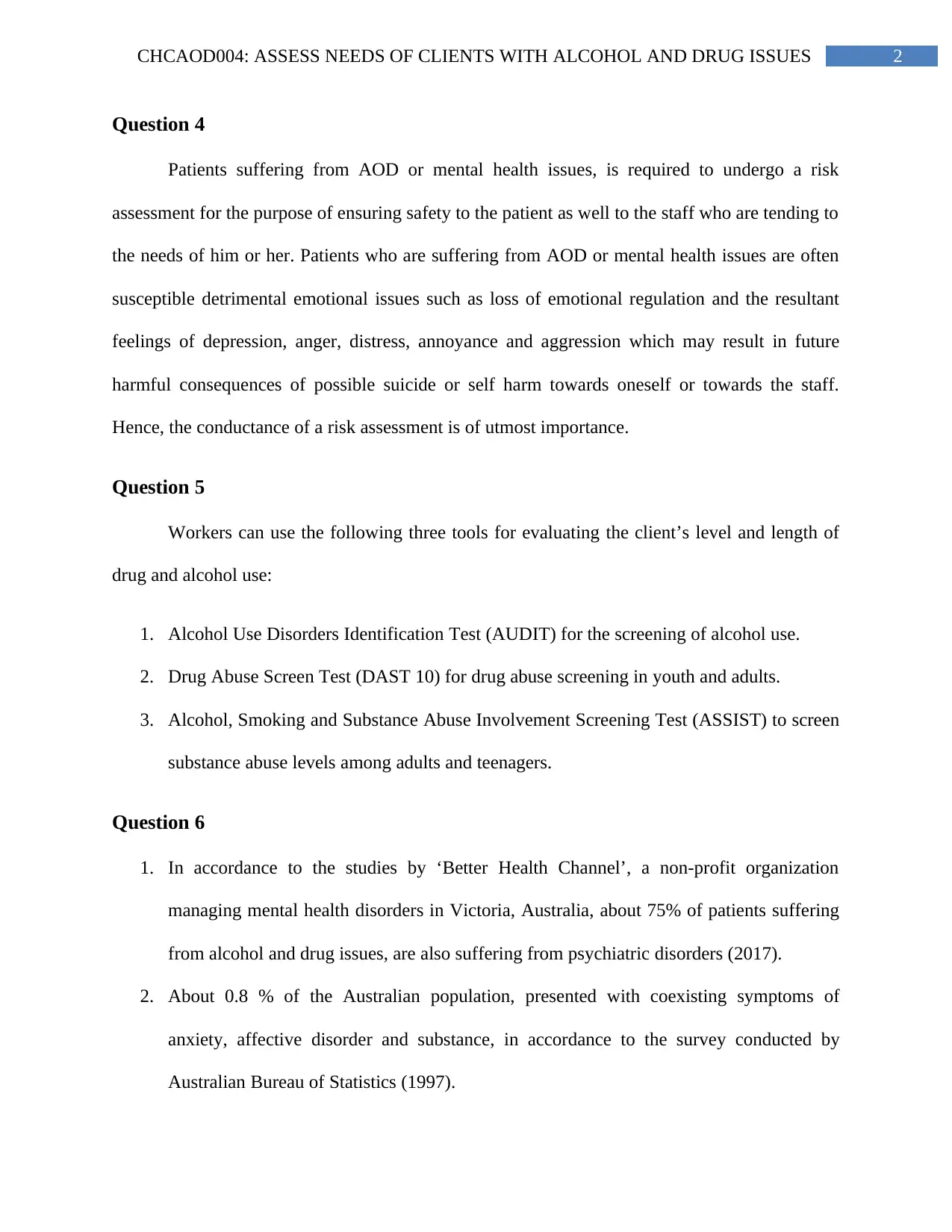
2CHCAOD004: ASSESS NEEDS OF CLIENTS WITH ALCOHOL AND DRUG ISSUES
Question 4
Patients suffering from AOD or mental health issues, is required to undergo a risk
assessment for the purpose of ensuring safety to the patient as well to the staff who are tending to
the needs of him or her. Patients who are suffering from AOD or mental health issues are often
susceptible detrimental emotional issues such as loss of emotional regulation and the resultant
feelings of depression, anger, distress, annoyance and aggression which may result in future
harmful consequences of possible suicide or self harm towards oneself or towards the staff.
Hence, the conductance of a risk assessment is of utmost importance.
Question 5
Workers can use the following three tools for evaluating the client’s level and length of
drug and alcohol use:
1. Alcohol Use Disorders Identification Test (AUDIT) for the screening of alcohol use.
2. Drug Abuse Screen Test (DAST 10) for drug abuse screening in youth and adults.
3. Alcohol, Smoking and Substance Abuse Involvement Screening Test (ASSIST) to screen
substance abuse levels among adults and teenagers.
Question 6
1. In accordance to the studies by ‘Better Health Channel’, a non-profit organization
managing mental health disorders in Victoria, Australia, about 75% of patients suffering
from alcohol and drug issues, are also suffering from psychiatric disorders (2017).
2. About 0.8 % of the Australian population, presented with coexisting symptoms of
anxiety, affective disorder and substance, in accordance to the survey conducted by
Australian Bureau of Statistics (1997).
Question 4
Patients suffering from AOD or mental health issues, is required to undergo a risk
assessment for the purpose of ensuring safety to the patient as well to the staff who are tending to
the needs of him or her. Patients who are suffering from AOD or mental health issues are often
susceptible detrimental emotional issues such as loss of emotional regulation and the resultant
feelings of depression, anger, distress, annoyance and aggression which may result in future
harmful consequences of possible suicide or self harm towards oneself or towards the staff.
Hence, the conductance of a risk assessment is of utmost importance.
Question 5
Workers can use the following three tools for evaluating the client’s level and length of
drug and alcohol use:
1. Alcohol Use Disorders Identification Test (AUDIT) for the screening of alcohol use.
2. Drug Abuse Screen Test (DAST 10) for drug abuse screening in youth and adults.
3. Alcohol, Smoking and Substance Abuse Involvement Screening Test (ASSIST) to screen
substance abuse levels among adults and teenagers.
Question 6
1. In accordance to the studies by ‘Better Health Channel’, a non-profit organization
managing mental health disorders in Victoria, Australia, about 75% of patients suffering
from alcohol and drug issues, are also suffering from psychiatric disorders (2017).
2. About 0.8 % of the Australian population, presented with coexisting symptoms of
anxiety, affective disorder and substance, in accordance to the survey conducted by
Australian Bureau of Statistics (1997).
⊘ This is a preview!⊘
Do you want full access?
Subscribe today to unlock all pages.

Trusted by 1+ million students worldwide
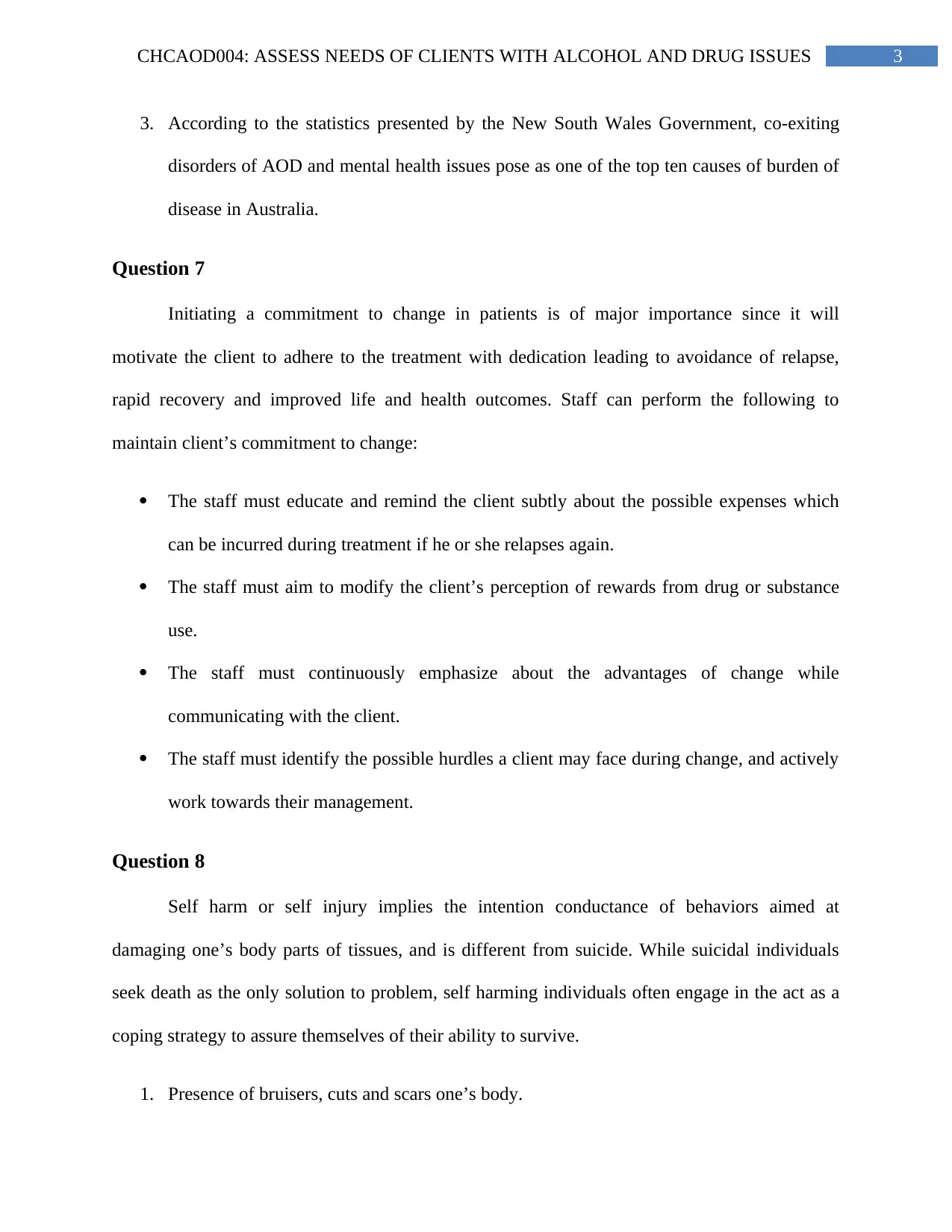
3CHCAOD004: ASSESS NEEDS OF CLIENTS WITH ALCOHOL AND DRUG ISSUES
3. According to the statistics presented by the New South Wales Government, co-exiting
disorders of AOD and mental health issues pose as one of the top ten causes of burden of
disease in Australia.
Question 7
Initiating a commitment to change in patients is of major importance since it will
motivate the client to adhere to the treatment with dedication leading to avoidance of relapse,
rapid recovery and improved life and health outcomes. Staff can perform the following to
maintain client’s commitment to change:
The staff must educate and remind the client subtly about the possible expenses which
can be incurred during treatment if he or she relapses again.
The staff must aim to modify the client’s perception of rewards from drug or substance
use.
The staff must continuously emphasize about the advantages of change while
communicating with the client.
The staff must identify the possible hurdles a client may face during change, and actively
work towards their management.
Question 8
Self harm or self injury implies the intention conductance of behaviors aimed at
damaging one’s body parts of tissues, and is different from suicide. While suicidal individuals
seek death as the only solution to problem, self harming individuals often engage in the act as a
coping strategy to assure themselves of their ability to survive.
1. Presence of bruisers, cuts and scars one’s body.
3. According to the statistics presented by the New South Wales Government, co-exiting
disorders of AOD and mental health issues pose as one of the top ten causes of burden of
disease in Australia.
Question 7
Initiating a commitment to change in patients is of major importance since it will
motivate the client to adhere to the treatment with dedication leading to avoidance of relapse,
rapid recovery and improved life and health outcomes. Staff can perform the following to
maintain client’s commitment to change:
The staff must educate and remind the client subtly about the possible expenses which
can be incurred during treatment if he or she relapses again.
The staff must aim to modify the client’s perception of rewards from drug or substance
use.
The staff must continuously emphasize about the advantages of change while
communicating with the client.
The staff must identify the possible hurdles a client may face during change, and actively
work towards their management.
Question 8
Self harm or self injury implies the intention conductance of behaviors aimed at
damaging one’s body parts of tissues, and is different from suicide. While suicidal individuals
seek death as the only solution to problem, self harming individuals often engage in the act as a
coping strategy to assure themselves of their ability to survive.
1. Presence of bruisers, cuts and scars one’s body.
Paraphrase This Document
Need a fresh take? Get an instant paraphrase of this document with our AI Paraphraser
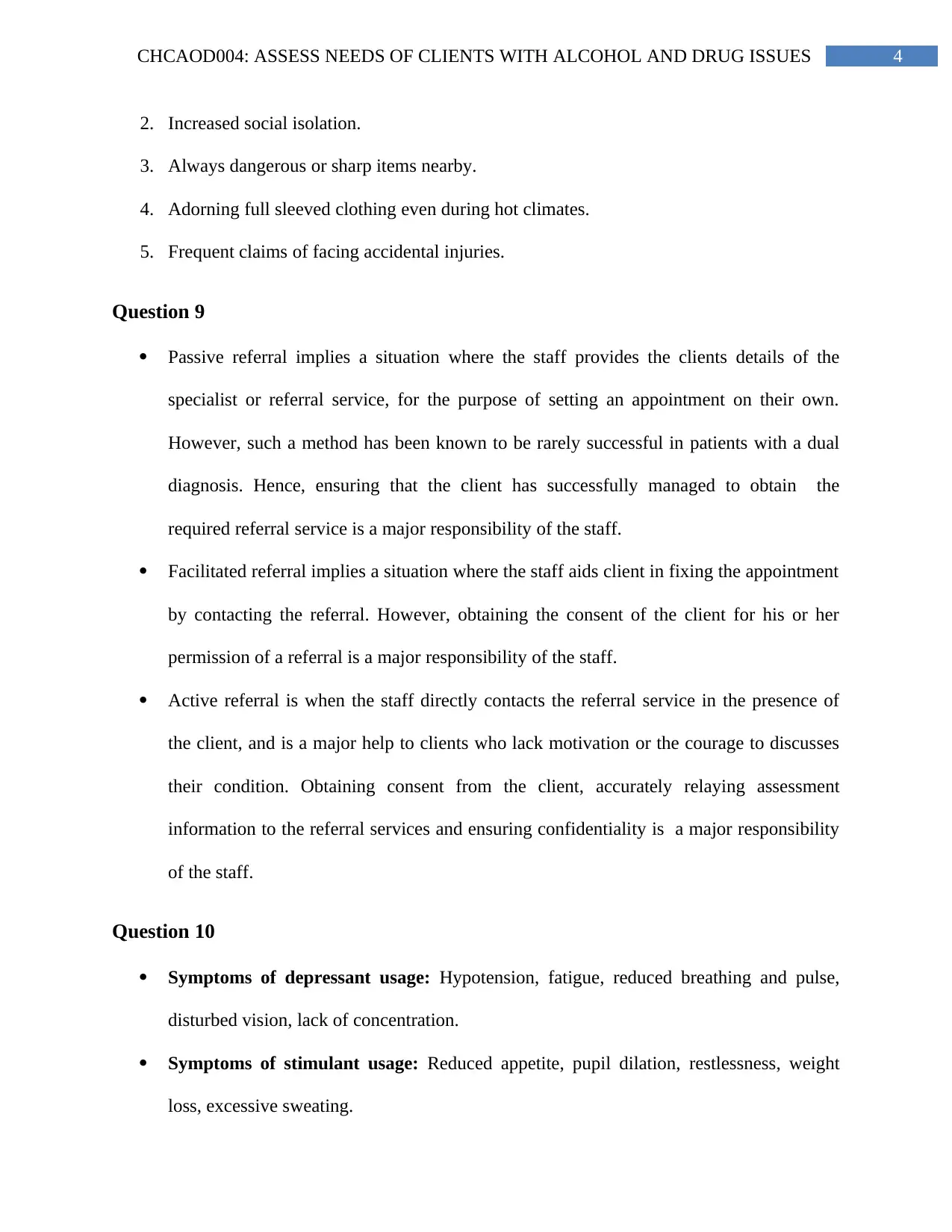
4CHCAOD004: ASSESS NEEDS OF CLIENTS WITH ALCOHOL AND DRUG ISSUES
2. Increased social isolation.
3. Always dangerous or sharp items nearby.
4. Adorning full sleeved clothing even during hot climates.
5. Frequent claims of facing accidental injuries.
Question 9
Passive referral implies a situation where the staff provides the clients details of the
specialist or referral service, for the purpose of setting an appointment on their own.
However, such a method has been known to be rarely successful in patients with a dual
diagnosis. Hence, ensuring that the client has successfully managed to obtain the
required referral service is a major responsibility of the staff.
Facilitated referral implies a situation where the staff aids client in fixing the appointment
by contacting the referral. However, obtaining the consent of the client for his or her
permission of a referral is a major responsibility of the staff.
Active referral is when the staff directly contacts the referral service in the presence of
the client, and is a major help to clients who lack motivation or the courage to discusses
their condition. Obtaining consent from the client, accurately relaying assessment
information to the referral services and ensuring confidentiality is a major responsibility
of the staff.
Question 10
Symptoms of depressant usage: Hypotension, fatigue, reduced breathing and pulse,
disturbed vision, lack of concentration.
Symptoms of stimulant usage: Reduced appetite, pupil dilation, restlessness, weight
loss, excessive sweating.
2. Increased social isolation.
3. Always dangerous or sharp items nearby.
4. Adorning full sleeved clothing even during hot climates.
5. Frequent claims of facing accidental injuries.
Question 9
Passive referral implies a situation where the staff provides the clients details of the
specialist or referral service, for the purpose of setting an appointment on their own.
However, such a method has been known to be rarely successful in patients with a dual
diagnosis. Hence, ensuring that the client has successfully managed to obtain the
required referral service is a major responsibility of the staff.
Facilitated referral implies a situation where the staff aids client in fixing the appointment
by contacting the referral. However, obtaining the consent of the client for his or her
permission of a referral is a major responsibility of the staff.
Active referral is when the staff directly contacts the referral service in the presence of
the client, and is a major help to clients who lack motivation or the courage to discusses
their condition. Obtaining consent from the client, accurately relaying assessment
information to the referral services and ensuring confidentiality is a major responsibility
of the staff.
Question 10
Symptoms of depressant usage: Hypotension, fatigue, reduced breathing and pulse,
disturbed vision, lack of concentration.
Symptoms of stimulant usage: Reduced appetite, pupil dilation, restlessness, weight
loss, excessive sweating.

5CHCAOD004: ASSESS NEEDS OF CLIENTS WITH ALCOHOL AND DRUG ISSUES
Symptoms of hallucinogen usage: Impairment in motor function, memory loss,
disturbed neural function, excessive depression, reduced sensory perception.
Symptoms of hallucinogen usage: Impairment in motor function, memory loss,
disturbed neural function, excessive depression, reduced sensory perception.
⊘ This is a preview!⊘
Do you want full access?
Subscribe today to unlock all pages.

Trusted by 1+ million students worldwide
1 out of 6
Related Documents
Your All-in-One AI-Powered Toolkit for Academic Success.
+13062052269
info@desklib.com
Available 24*7 on WhatsApp / Email
![[object Object]](/_next/static/media/star-bottom.7253800d.svg)
Unlock your academic potential
Copyright © 2020–2026 A2Z Services. All Rights Reserved. Developed and managed by ZUCOL.





